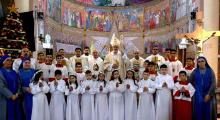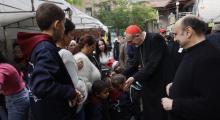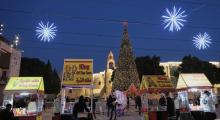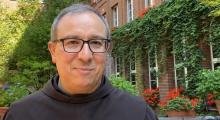Issued by the Catholic Center for Studies and Media - Jordan. Editor-in-chief Fr. Rif'at Bader - موقع أبونا abouna.org
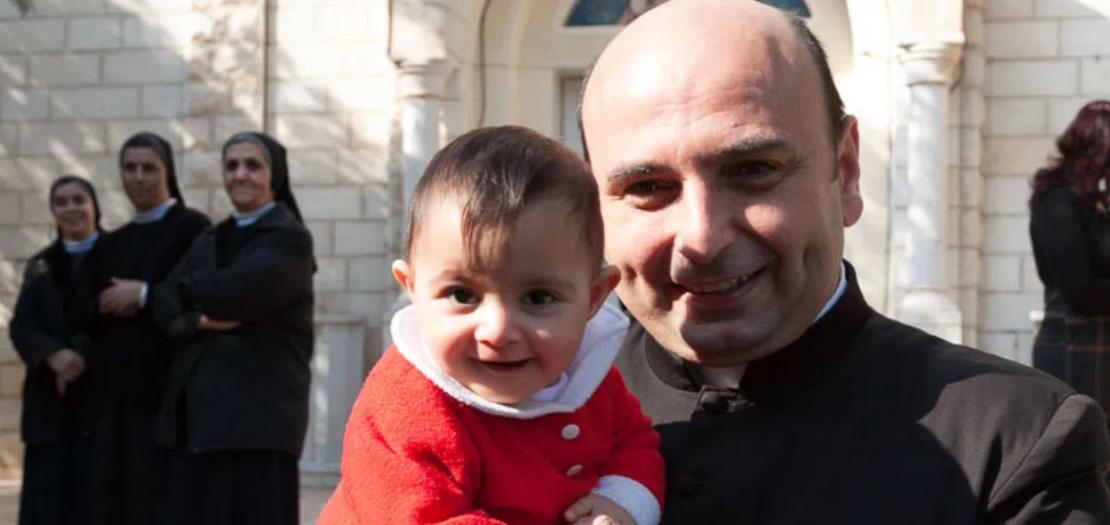
The news that Gaza was eagerly waiting for was welcomed by prayers for peace, something that has done every evening for 15 interminable months full of death and destruction, including at the Latin parish of the Holy Family, Gaza’s small Catholic community, where news of the ceasefire was met with a great sense of relief.
"People are celebrating because, as Pope Francis said so many times, war is a defeat for everyone," says Fr. Gabriel Romanelli, Holy Family parish priest, in a video in Spanish posted on his Facebook page last night.
"The truce is good news, even if its implementation will be very complicated,” he notes. “The mechanism is long and complex; some details have not yet been disclosed. But what is known is that the Israeli hostages will be freed after suffering for almost a year-and-a-half deprived of their freedom. On the other hand, the Palestinian prisoners held by the State of Israel” will also be released, but the “list has not yet been provided.”
In addition to military withdrawal and the permission for humanitarian aid, two other aspects are being looked at with great attention at Holy Family parish, which is located in Gaza City, in Gaza’s beleaguered northern area.
"There is talk of people returning to northern Gaza, but few details so far,” Fr. Romanelli says in the video. "Out of the 1.1 million people living in this area before the war, currently 400,000 are left. Hundreds of thousands of people are thus in the southern part, in tents, caravans or containers waiting to return.
“Then there is the issue of the many wounded who urgently need treatment, especially abroad, because most of the health system here has collapsed under the bombings.”
More than 10,000 people have been injured or are seriously ill, waiting for permits to leave the Gaza Strip for treatment. Many cases are very serious.
“The ceasefire is not the solution to the conflict, but it is an absolutely necessary step," the Argentine priest from the Congregation of the Incarnate Word told us a few days ago.
On 7 October 2023, he was not in Gaza and only managed to return in May last year, going back to his ministry, working a confrere, Fr. Yusuf As‘ad, from Egypt, and some Sisters of his own religious family, as well as some missionaries of Charity, the Sisters of Mother Teresa.
"It will be a long road, but we thank God for this truce,” he added today. “We call on him to ensure that the commitments are respected and that this will be the beginning of the end of this war, leading truly to peace between Palestine and Israel. A peace based on justice and reconciliation.”
“Over the past months, the Christian community has suffered what everyone else has suffered, our Muslim neighbors, civilians, families in the neighborhood," he explained.
During this time, he did everything possible to meet the basic needs of Christians, mostly Greek Orthodox, who took refuge in the parish, and Muslim neighbors.
“Currently, there are about 500 of us in the Holy Family compound. We had to turn the school’s classrooms into rooms for families, but we still try to teach the children and young people so that they do not miss the school year.”
Some educational and recreational activities have also been organized for them, above all by the nuns, a kind of oratory, to create a minimum sense of normality in a place where nothing is normal anymore.
“I am afraid of the bombings and dream of returning to our house, but it was destroyed. I feel very sad and scared because every day we hear and see bombs and destruction,” wrote nine-year-old Natalie a few weeks ago.
“I hate war and dream of feeling safe again. I cry every time I leave the Church because I am afraid. My parents keep telling me that Jesus protects us, but I'm afraid and cry because I don't want to lose anyone in my family.”
"When we came under siege,” writes another child refugee in the parish, 11-year-old Amir, "I was afraid that I could die at any moment. I think about arms manufacturers. Why do you do this? You are killing innocent people. Let us ask Jesus to stop the war. We ask all Christians to pray for us.”
The future of these young people and the need to really turn the page for the peoples of this land is also reflected in the declaration the Catholic bishops of the Holy Land issued this morning in response to the ceasefire.
“We are aware that the end of the war does not mean the end of the conflict. Genuine and lasting peace can only be achieved through a just solution that addresses the origin of this long-standing struggle,” reads the statement.
“We pray that this ceasefire will bring a sense of serenity and relief to all. May this moment of calm allow all to find solace, rebuild their lives and regain hope for the future.”
As the prelates “eagerly await” the return of pilgrims to the Holy Places, which are “meant to be places of prayer and peace,” the bishops call on the faithful and people of good will “to look to the future with unwavering hope.”
“May this ceasefire inspire new efforts for dialog, mutual understanding and lasting peace for all. At the beginning of the Jubilee Year dedicated to hope that does not disappoint, we read in this event a sign that reminds us of God's faithfulness.”
Lastly, the bishops call on political leaders and the international community “to develop a clear and just political vision for the post-war period. A future built on dignity, security and freedom for all peoples is a prerequisite for true and lasting peace. We urge all parties to implement the immediate steps and negotiate the future steps of the agreement in good faith.”


